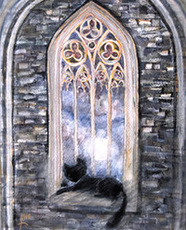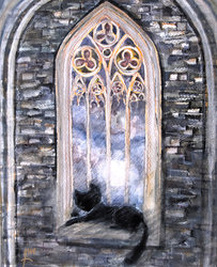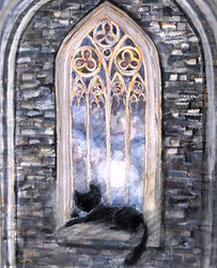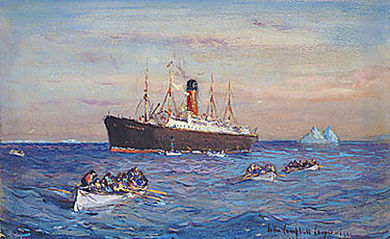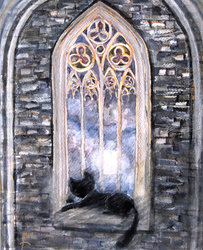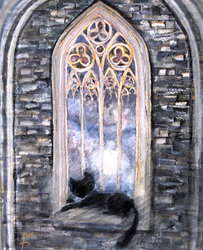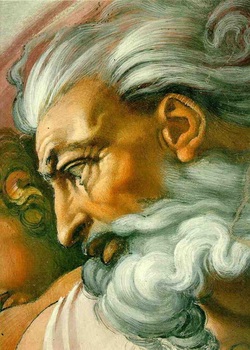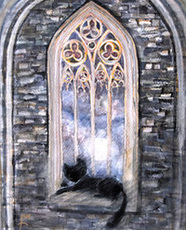
Once upon a time, there was a man named Bernardus, who was espoused to a beautiful wife. She was spotless and pure and wore a gleaming white garment without stain or wrinkle having remained so her whole life. This beautiful wife had been chosen for Bernardus by his father, a wise and prudent man named Marcelus.
Bernard lives a simple life with a modest house, surrounded by rolling green hills grazed upon by a few cows. Sometimes Bernardus would long for a life of greatness, doing great things in the service of God. His father knowing this, warned him many times to beware the grandeur of Roma and its flesh pots. The Romans had indeed strayed from the true love of beauty, that shines forth so clear in Bernard's spouse Ecclesia.
One day, sadly, the father of Bernardus, Marcelus, passed away, having given all he had received. A while before his passing Marcelus himself had paid a visit himself to the Romans. Before his departure he spoke of the visit.
“This visit shall be dangerous and probable useless, but it has to be done.” he said.
Back then young Bernardus had wished also to come along.
“May I come? May I see if they are wise like you father? he requested
“How will you learn that, my son?” his father asked.
“The men of Rome can look like me, if it suits their purpose with you. Are you not yet wise enough to detect all their counterfeits?”he continued.
What is the danger? Bernardus asked. “Will the Romans shoot at us, pour fire out their windows; or can Roma put a spell on us at a distance?” he enquired.
“The last is most likely if you approach their doors with a light heart, beware their voice!” the father warned and continued.
“For they speak low and melodious, its very sound an enchantment. If you listen to their words unwarily, you will hardly remember the words themselves, for little power will remain in you. Mostly you will only remember it was a delight to hear the voice speaking and the words will seem familiar, wise and reasonable. They will make you think yourself wise. When other people speak it will seem harsh and uncouth by contrast. If others contradict the voice, anger may be kindled in your heart, if, you be under the spell. For the many that it shall conquer, the spell will endure, even when they are far away. No one remain can unmoved; no one can reject its pleas and commands without great effort of mind and will, so long as its Master has control of it.” he concluded
The men in Roma had long since turned from the True path. Their knowledge of good and evil had been corrupted. Since the passing of Marcelus loneliness had weighed heavy on the shoulders of Bernardus. His father, with his charismatic spirit was no longer there to lighten the load. The allure of Roma became so strong that he ventured to seek dialogue with them. So Bernardus departed leaving his spouse to speak with the man in white, Papa, the head of the Romans, that he may be accepted as their friend.
The town of the Romans was indeed beautiful, the buildings grand, marble halls and golden ornaments. The garden of the Roma was indeed alluring, Bernardus saw that the trees were good to eat, and fair to the eyes, and delightful to behold.1
“Would you like to eat of the fruit of the tree that is fair to the eyes?” asked Luciano one of the Romans.
“I have heard about the fruit of these tree,” Bernardus replied, “how fair they are, but my father always commanded me to never touch it, for by doing so I would be unfaithful to my spouse.” he replied
“No! No!,” repied Luciano, “that was then, nowadays it is ok, times have changed, this is the 21st century” Luciano explained
“So I will not die the death?” he asked.
“Indeed no, the light of science has proved they are safe to eat now, and in doing so you be truly wise in the knowledge of all things, and be great and noble as the men of old.” Luciano proclaimed.
Luciano lead Bernardus to Papa so that they may engage in dialogue. Bernardus greeted Papa as Papa the white. Papa seemed annoyed. I am Papa the wise, Papa, bearer of the Fisherman's ring and Papa of many colors.
Bernardus looked and saw that his robes though they appeared white, were not so, but were woven of many colors, so that as he moved it changed hue so the eye was bewildered.
“Why do you not wear white as before, I liked white better?” asked Bernardus.
“White!” he exclaimed. “It serves as a beginning.”
“For now, I can still be Papa the white to you, but remember white can be broken and contain all colors,” he explained. “Our spouses also wear many colors, though your Ecclesia still is old fashioned, I hear and insists on white alone, that is nice, but the older days are gone, the Middle days are passing and the Younger days are beginning.”
Bernardus remembered his father explaining that the wives of the Romans wore many colors and how this was not pleasing to God.
“We have had made it lawful to have a spouse of many colors, do you approve?” Papa ventured to ask.
“If thou has made it lawful, who am to say it is illegitimate.” he answered. “Though I prefer rather that my spouse be in white, than appear multicoloured.”
Let us come to an arrangement then,” Papa said. “If you agree that we can lawfully have a multicolored spouse, then you may keep yours the way she is, for old times sake.”
Bernardus returned back to his modest home to ponder these things a while. He still loved his Ecclesia, but the fruits trees of Roma, so fair to the eyes, were tugging at his heart. He decided one April morn after talking with some friends, that he would commit his whole household to an arrangement with the men of Roma. He sent a letter to say that was lawful to break with the things of the past and become multicolored in ones outward appearance, by using the light from the past. He would bind all his household to accept these new customs of Roma as good and lawful.
Sadly there seems to be no 'happily ever after' to this Tale. Tradcat thinks it may indeed turn out to be more of a Greek Tragedy.
Veni Domine
1. Gen. 3. v6
*All characters in this tale are just fictitious and they do not reflect to any persons alive or dead or to any political or religious persons.
